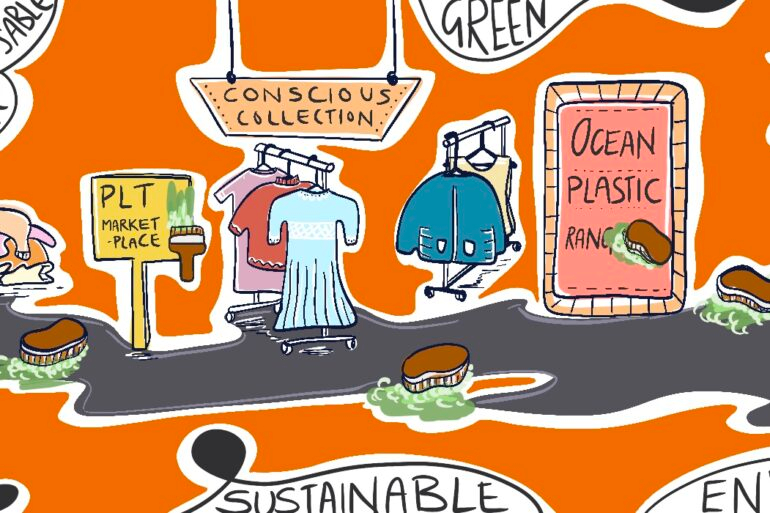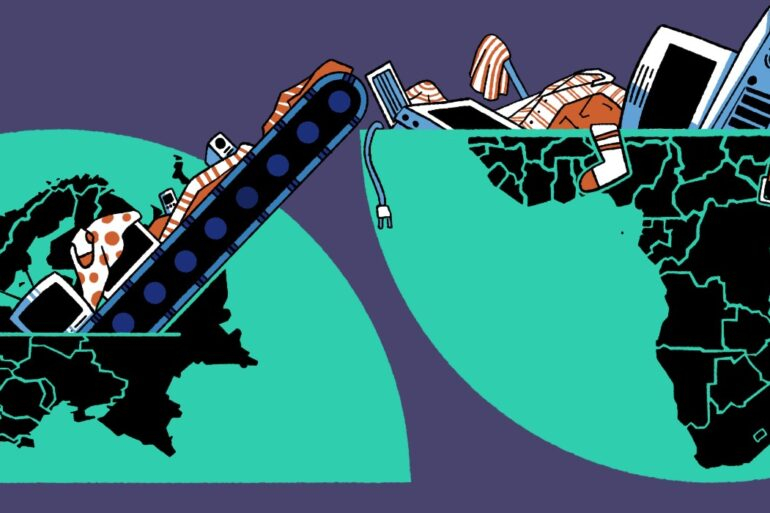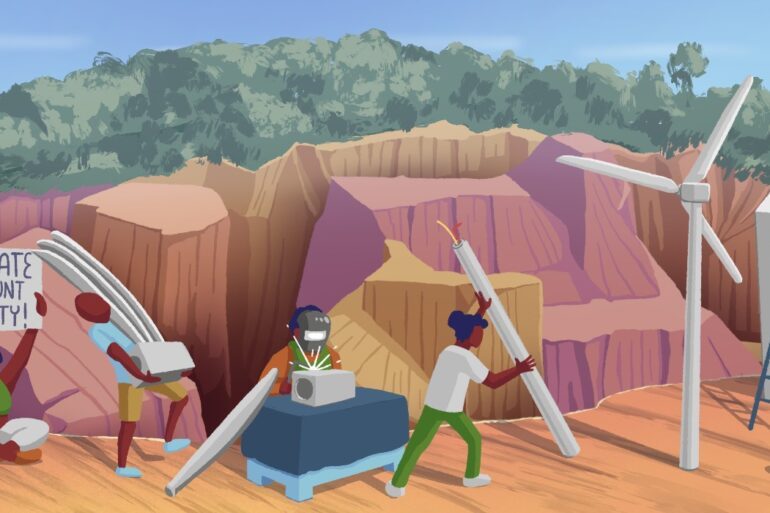A brief history of green colonialism
Far from a novel phenomenon, green colonialism extends the trajectory of a centuries-old project. Today, it may manifest in new forms, cloaked in the language of sustainability and conservation, yet the foundational systems of exploitation and extraction persist—simply repackaged as environmentally friendly initiatives or justified in the name of preserving nature.
In our collective search to mitigate the climate crisis, the global community has rallied around ideals such as “green transitions” and “just transitions,” viewing them as messengers or solutions for a more equitable future. However, a deeper exploration into many narratives that come with this and their practical applications reveals a starkly different reality.
The spectre of green colonialism casts a long shadow, undermining our hopes for achieving true climate justice. This phenomenon, often sidelined in mainstream environmental discussions, urgently requires our attention. It compels us to consider the tangled interplay of environmentalism, social justice, and post-colonial theory, and to reflect on the power imbalances, systemic injustices, and marginalised voices that permeate the environmental movement. As we navigate the nuances of our rapidly evolving world, confronting the disquieting truths of green colonialism is not merely advisable – it is imperative.
In their latest book, Dismantling Green Colonialism: Energy and Climate Justice in the Arab World, Hamza Hamouchene and Katie Sandwell meticulously define green colonialism as “the extension of colonial relationships involving plunder, dispossession, and dehumanisation – now repurposed for the green era of renewable energies.”
This new phase of colonialism shifts the socio-environmental costs to peripheral countries and communities, prioritising the energy demands of wealthier regions at the expense of others, often Indigenous communities, campesino communities, poor and working class.
Green colonialism critiques the approaches taken by governments, corporations, NGOs, and academia that fail to address the entrenched systems fueling today’s crises. These approaches may transition us from a dependence on fossil fuels to renewable energy sources, yet they often neglect to tackle the political, economic, and social dynamics that lie at the heart of these issues.
Who profits from green colonialism? How has it manifested?
Addressing the climate crisis and transitioning towards renewable energies raises questions of who controls, owns and benefits from renewable energy and who faces the burdens. Those means of control are usually framed through narratives that have justified the existence of “sacrifice zones”.
Representations of marginal, chaotic, empty, underutilised lands and therefore available for green investment are narratives that uncover issues of communal ownership and sovereignty, and make people’s lives and culture invisible to decision-making processes.
Policies and laws building on those narratives have enabled the maintenance of power disbalances in which people and vast territories of land are dispossessed and extracted for the sake of “progress”. In this case, under the frame of “green growth”, green-related projects in the South continue to favour historical colonial powers and the expansion of capitalism.
According to Héctor Alimonda, wealth accumulation regimes have shaped the representations of Latin America and other regions of the Global South as subaltern spaces that can be exploited, destroyed and reconfigurated. In this context, green colonialism is an attempt to switch sources of energy, without changing the structures of powers and the logic of capitalist accumulation that have been favoured by the subaltern representations of the territories in the South.
How does green colonialism impact different communities?
Green colonialism manifests in four dimensions shaped by the North and South unequal geopolitical relationships:
(i) Exploitation of ‘unlimited resources’ in the run for transitioning to non-fossil fuel sources of energy.
(ii) Imposition of conservation lands to develop carbon market related projects.
(iii) Convert lands into toxic landfills of electronic waste.
(iv) Projecting an asymmetric market of renewable technology in which countries in the Global South pay a higher price.
All those dimensions have something in common – a narrative that disregards people’s connection to their places, to their land. A bond that defines people’s survival, spirituality, language, and legacy.
While Western countries’ climate agenda is dominated by expressions such as renewable energy, clean technologies, and green transition, communities in the Global South who are currently facing the worst effects of the climate crisis are also exposed to face the burdens of an unjust energy transition.
In South Africa, the production of hydrogen is expected to worsen water security in the country and expose frontline communities to a heightened risk of food and water shortages to extract a steady supply of hydrogen fuel. In Chile lithium extraction has dispossessed the Colla Pai-Ote Indigenous people from their lands and polluted sources of clean water. The Midelt solar plants in Morocco appropriated the land and resources of the pastoril tribe Sidi Ayad without their approval. These are only a few of many cases that represent the real face of a green transition without considerations of justice.
What do alternatives to green colonialism look like?
Alternatives to green colonialism provide a transformative vision for a world shaped by justice, equity, cooperation, care, regeneration, interdependence, redistribution, solidarity and repair. At the heart of this vision lie reparations – reconstructive efforts designed not merely to shift power within existing frameworks, but to rebuild systems to support a diversity of perspectives, approaches, and worldviews. This stands in stark contrast to capitalism’s tendency to monopolise and exhaust nature’s gifts.
As green colonialism expands, communities organise and resist. Movements globally, such as the Asian Peoples’ Movement on Debt and Development, the Global Campaign to Demand Climate Justice, the Third World Network, the Climate Reparations Network in the UK, advocate for a series of proactive and preventative measures that redefine our approach to climate justice. These include compelling polluters like coal, oil, and gas companies to pay for climate reparations, aggressively phasing out fossil fuels, and endorsing a fossil fuel non-proliferation treaty to ensure a definitive move away from such energy sources.
Moreover, these movements call for the creation of quality, green jobs that support workers transitioning from high-carbon industries, alongside democratising the financial and corporate sectors to enforce a just transition.
In Latin America and the Caribbean, grassroots organisations came together to create the “Map of False Solutions to the Climate Crisis”. What is called “Mapping the Resistance” is a collaborative tool for communities to voice, amplify, and weave the resistance of communities impacted by green colonialism. In North Africa, the people of Sidi Ayad and women from the Soulaliyate movement have protested against the Midelt project and demanded their right to access to land and fair compensation for the loss of the ancestral land in which the solar land has been built.
Investment is also sought in community infrastructure, housing, and land access with robust social protections, ensuring that those most affected by climate change, economic precarity, and health disparities are prioritised. Additionally, these groups advocate for polluting countries and multinationals to assume financial responsibility for the climate damages they have caused globally.
On the prohibitive side, they demand an end to new coal, oil, gas, and fracking projects, cessation of public funds to polluting industries, and the stopping of private financial support for fossil fuel extraction. Other critical measures include curbing fossil-fuel driven militarisation and infrastructure projects that harm the environment, halting debt collection from impoverished nations and communities, and reforming hostile migration policies to allow safe, dignified migration.
By granting decision-making power to communities on the frontline of multiple injustices, these alternatives not only challenge green colonialism but pave the way for a genuinely sustainable future.
How can we achieve this?
As we strive for a just transition away from our reliance on fossil fuels, it’s crucial to recognise that there is no perfectly clean or wholly benevolent energy source on Earth. The challenge of overcoming our fossil fuel addiction is compounded by the emergence of green colonialism, which masks old exploitations under new guises, presenting so-called green solutions that fail to fundamentally alter or touch oppressive systems. These solutions, often touted as the sole path forward, can divert attention from the urgent need to develop truly sustainable and equitable alternatives.
Understanding how green colonialism manifests allows us to critically assess these solutions and recognize them as potentially false promises. This awareness is pivotal as we seek to balance the immediate need for energy transition with the imperative to build new systems rooted in justice, equity, cooperation, care, regeneration, interdependence, redistribution, solidarity, and repair. As we navigate this complex landscape, our goal must not merely be to replace one form of energy with another but to transform the very frameworks and logics that control our lives under these systems.
What can you do?
- Read Dismantling Green Colonialism: Energy and Climate Justice in the Arab Region, a book edited by Hamza Hamouchene and Katie Sandwell.
- Listen to Planet B, a podcast A podcast series about a world that isn’t just saved from climate breakdown, but is renewed and transformed by the fight against it: Planet B | Novara Media
- Join the Climate reparations network and hear about actions we are collectively taking on green colonialism by registering here: Climate Reparations
- Learn: What are Climate Reparations?















